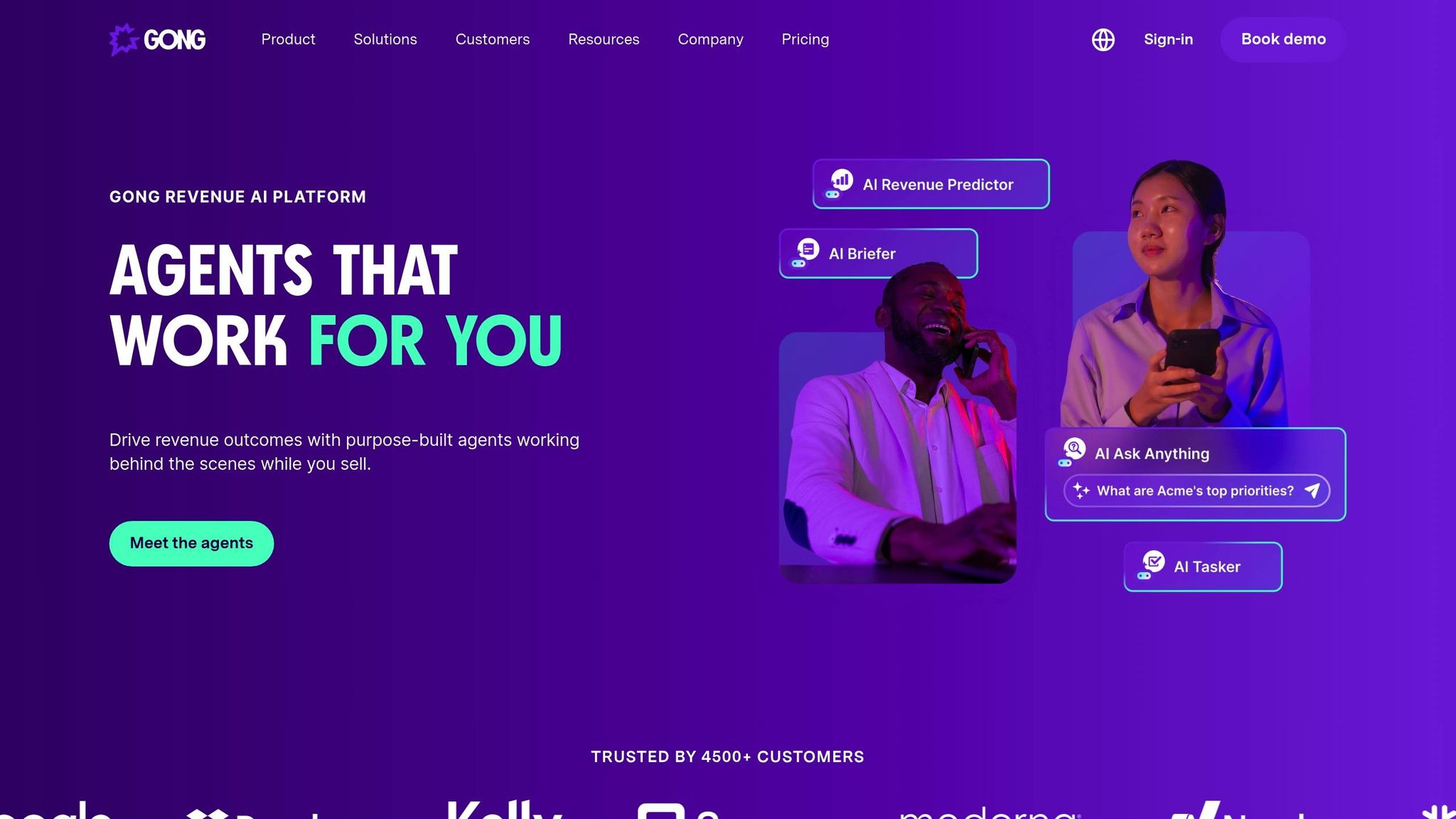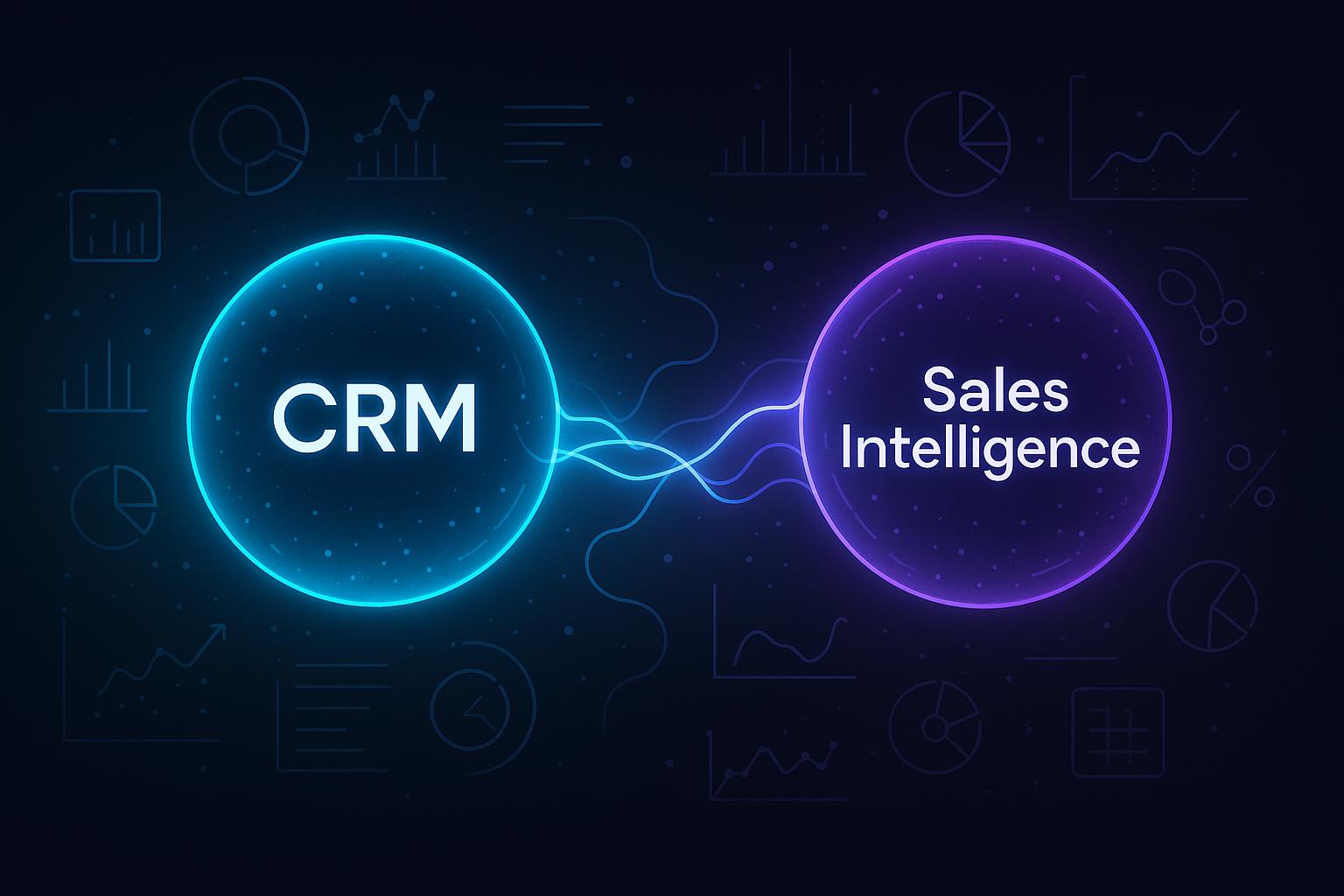Here’s what you need to know upfront:
- Why It Matters: Sales teams using AI saw 83% revenue growth in 2024, compared to 66% for non-AI users. Companies using AI coaching tools also achieve 73% quota attainment.
- Key Features to Look For:
- Call Analysis: Sentiment detection, talk-to-listen ratio, and filler word tracking.
- Personalized Coaching: Real-time feedback, custom playbooks, and role-playing scenarios.
- Metrics Tracking: Dashboards for performance, coaching impact, and skill development.
- Business Considerations: Ensure CRM and communication tool integration, scalability, and user-friendly design.
- Security and Setup: Prioritize data encryption, compliance, and easy configuration.
Quick Comparison: Traditional vs. AI-Driven Sales Coaching
| Feature | Traditional Coaching | AI-Driven Coaching |
|---|---|---|
| Feedback Delivery | Periodic, often delayed | Real-time, continuous |
| Coverage | Spot checks of random calls | 100% call analysis |
| Scalability | Manager availability limits | Scales across teams |
| Objectivity | Prone to bias | Data-driven, consistent |
AI sales coaching tools save time, reduce onboarding by 50%, and improve conversion rates by 35%. Ready to dive deeper? Let’s explore how to choose the right tool for your team.
Must-Have Features in AI Sales Coaching Tools
Call Analysis and Insights
AI coaching tools use advanced analytics to transform customer calls into actionable takeaways. Research shows that 84% of buyers feel sales reps struggle to communicate value effectively in virtual settings.
| Analysis Feature | Business Impact |
|---|---|
| Sentiment Detection | Helps reps adjust their approach based on customer emotions |
| Keyword Tracking | Highlights successful pitch elements and missed opportunities |
| Talk-to-Listen Ratio | Ensures a balanced and effective conversation flow |
| Filler Word Detection | Enhances speech clarity and professionalism |
These tools don't just analyze calls - they also personalize coaching to boost individual performance.
Individual Coaching Features
AI-powered individual coaching delivers measurable results. Companies using these tools have seen seller engagement double and voluntary turnover rates drop by nearly 30%.
Top features include:
- Personalized feedback tailored to individual performance data.
- Real-time guidance during live customer calls.
- Custom training playbooks designed to address specific weaknesses.
- Role-playing scenarios for practicing sales techniques.
- Objection handling suggestions to improve response strategies.
"AI allows small businesses – which many times do not have the staff or resources of their competitors – to punch above their weight. It's encouraging to see small businesses embrace technology and express optimism for the future as these platforms serve as a catalyst for innovation and resilience." - Jordan Crenshaw, Senior Vice President of the Chamber's Technology Engagement Center
Consistent coaching is key, and tracking performance metrics ensures its effectiveness.
Sales Metrics and Tracking
Tracking key sales metrics is essential for continuous improvement and complements call analysis and personalized coaching efforts.
Key tracking capabilities include:
-
Performance Metrics Dashboard
Offers detailed analytics on individual and team trends, such as call scores, conversion rates, and deal progression. -
Coaching Impact Assessment
Measures the effectiveness of coaching, with data showing consistent coaching can improve win rates by 32% and quota attainment by 28%. -
Skill Development Tracking
Monitors specific skills like active listening, confidence, and patience, providing automated improvement suggestions based on AI analysis.
Without consistent reinforcement, sales reps forget 84% to 90% of what they’ve learned within a few months. This makes ongoing coaching and tracking critical for long-term success.
Business Requirements Checklist
Software Integration Options
Integrating seamlessly with your existing tools is crucial for effective AI sales coaching. Sales teams often juggle multiple platforms, so ensuring compatibility is a key consideration when choosing the right tool.
Here are the main integration features to check:
- CRM Integration: The AI tool should work directly with your CRM to:
- Update contact records
- Track deal progress
- Monitor engagement metrics
- Sync calendar events
- Communication Platforms: Ensure compatibility with tools like:
- Video conferencing software
- Email systems
- Social media management tools
- Sales engagement platforms
Next, consider how well the solution can grow with your business while improving the user experience.
Growth and User Experience
A good AI coaching tool should grow alongside your business without compromising performance or usability. Research shows companies that prioritize sales coaching achieve 26% higher win rates and 21% better quota attainment compared to others.
| Feature | How It Helps |
|---|---|
| User Onboarding | Simplifies the setup process for new team members |
| Customization | Aligns with your unique sales strategies |
| Performance Dashboards | Tracks team metrics and progress |
| Personalized Learning Paths | Helps develop specific skills for each seller |
"When coaching is relevant and delivers quick results, sellers are more likely to adopt and use our solution." - Anisha Gopal, Head of Coaching and Customer Success, Skwill AI
Finally, explore the pricing structure and long-term benefits.
Price and Business Value
When evaluating cost and ROI, focus on these areas:
- Cost Structure: Look at pricing based on:
- Number of users
- Feature tiers
- Storage needs
- Support options
- Measuring Value: Monitor metrics like:
- Win rate increases
- Quota achievement
- Time saved on admin work
- Overall team productivity
Studies indicate that effective coaching allows sellers to spend 23% more time selling and 21% less on administrative tasks.
"With coaching, you're helping to improve their skills within the context of a repeatable process or methodology – something the whole team can apply." - Becky Abraham, Associate Client Partner in Korn Ferry's Organization Strategy practice
To get the most out of your investment, focus on automating repetitive tasks and choose tools that offer round-the-clock support and fast response times.
Technical Requirements Checklist
Data Security Standards
When choosing AI sales coaching tools, protecting sensitive customer data and complying with industry regulations should be a top priority. Sales interactions produce a large amount of data, which needs to be handled securely.
| Security Requirement | Description | Verification Steps |
|---|---|---|
| Data Encryption | Encrypt data both in transit and at rest | Check for SSL/TLS protocols and encryption methods |
| Access Controls | Use role-based permissions and authentication | Confirm support for multi-factor authentication (MFA) and detailed access settings |
| Compliance Certifications | Meet recognized standards and regulations | Look for certifications like ISO/IEC 27001, GDPR, and CCPA |
| Data Retention | Establish clear policies for storage and deletion | Review retention schedules and deletion processes |
Perform regular security audits to maintain data integrity and ensure compliance with critical regulations. Once these measures are in place, configure the system to fully leverage its security features.
Setup and Configuration
A well-documented implementation process ensures the tool is set up to meet your technical needs.
Focus on configuring these key elements:
- Scoring system adjustments
- Custom coaching frameworks
- Alert and notification settings
- Performance metric thresholds
- Team hierarchy and role settings
After completing the configuration, evaluate the AI technologies behind the tool to ensure they perform effectively.
AI Technology Assessment
Examine the AI platform's ability to provide accurate natural language processing (NLP), adapt to new patterns, and deliver real-time insights. For NLP, assess how well the platform handles conversation analysis, including accuracy, context understanding, sentiment detection, and support for multiple languages. For machine learning, evaluate its ability to recognize patterns, adapt to evolving sales strategies, and personalize coaching.
Strong AI performance is crucial for effective coaching. Research shows that sales teams combining AI with proper training are 3.3 times more likely to meet their quotas compared to teams relying on AI alone.
To get the best results, ensure the AI platform can handle industry-specific terminology, align with your sales methodology, provide real-time coaching tips, and turn conversation data into actionable insights.
sbb-itb-3ed3a29
Setup and Usage Guide
Rollout Steps
Introducing AI sales coaching tools requires a thoughtful approach. Begin with a pilot program involving a small group of sales reps. This helps test the tool, uncover potential issues, and fine-tune the implementation process.
| Phase | Duration | Key Activities | Success Metrics |
|---|---|---|---|
| Pilot | 2–4 weeks | Select a test group, configure features, gather feedback | Measure initial adoption and engagement |
| Assessment | 1–2 weeks | Review pilot results, adjust settings, document practices | Evaluate performance and satisfaction |
| Full Deployment | 4–8 weeks | Onboard the entire team, align with existing workflows | Track adoption and productivity gains |
After the rollout, focus on training your team to ensure they can use the system effectively.
User Training Plan
A well-structured training plan is essential for success after deployment.
"Combining AI's precision with the intuition and mentorship of skilled managers creates a balanced approach that drives long-term success." - Peter Kyranakis, VP of Solution Consulting & Sales Enablement at Allego
- Initial Onboarding: Offer hands-on, interactive sessions to build confidence and familiarity with the tool.
- Advanced Feature Training: Dive into advanced functionalities like custom scoring and analytics. For instance, when Diligent adopted the Gong AI platform, their close rates improved by 7.4%, and sales reps hit quotas three weeks sooner.
- Ongoing Development: Schedule periodic refreshers and updates. Provide a resource library so users can learn at their own pace.
Performance Monitoring
Keep a close eye on performance metrics to maintain and enhance results. Research shows that consistent coaching can increase win rates by 32% and quota attainment by 28%.
Key metrics to track include:
- Sales performance
- Coaching effectiveness
- Tool usage rates
- ROI indicators
Regular check-ins with your team are just as important. Gather feedback to address challenges and optimize the tool's impact. Companies that invest in sales coaching and development tools report a 57% higher success rate.
Automate Sales Coaching with AI-Powered Gong Call Analysis

Conclusion
When choosing an AI sales coaching tool, it's crucial to focus on a few key areas to ensure it meets your needs and delivers real results. With 62% of revenue enablement leaders already using AI, picking the right solution requires careful consideration of several factors.
Key Areas to Evaluate
Technology Foundation
The platform should integrate seamlessly with your existing tools and maintain strong security protocols. Its AI features need to align closely with your sales processes and team requirements.
Business Impact
Research shows that effective sales coaching can lead to impressive results:
- A 25–40% boost in average deal size and sales activity
- 57% higher success rates for teams using sales coaching technology
- 9% improvement in win rates through AI-driven meeting preparation
Future-Ready Capabilities
With 71% of leaders forecasting AI's importance for revenue enablement in the next two years, it's essential to choose a scalable solution. Look for features like personalized coaching paths, automated performance tracking, and user-friendly interfaces.
To maximize the tool's effectiveness, regularly review performance metrics, gather team feedback, and fine-tune the AI settings. By following this approach, you can select a solution that delivers measurable improvements in your sales outcomes.
FAQs
How can AI sales coaching tools work with our current CRM and communication platforms?
AI sales coaching tools are designed to seamlessly integrate with your existing CRM systems and communication platforms. They typically connect via APIs, enabling smooth data sharing and synchronization. This allows the tools to analyze sales activities, conversations, and performance metrics directly from your current systems.
When evaluating these tools, check for compatibility with popular CRMs like Salesforce or HubSpot, as well as communication platforms such as Zoom, Microsoft Teams, or Slack. Many AI tools also offer built-in integrations or plugins to make setup quick and easy. Ensuring smooth integration minimizes disruptions and helps your team get the most out of the technology.
What security and compliance standards should I look for in an AI sales coaching tool?
When evaluating an AI sales coaching tool, prioritize data security and compliance to protect sensitive information. Look for tools that use advanced encryption for data storage and transmission, and ensure data is anonymized wherever possible.
Verify the provider complies with key regulations like GDPR and CCPA and has a strong track record of safeguarding user privacy. Additionally, review their data protection policies to ensure they align with your organization's standards. Choosing a provider with robust security measures helps build trust and minimizes risks.
How do AI-powered coaching tools improve sales team performance and help meet quotas more effectively than traditional methods?
AI-powered coaching tools elevate sales team performance by providing personalized, data-driven insights and automating repetitive tasks. These tools analyze sales conversations and performance metrics to deliver tailored coaching, real-time feedback, and actionable recommendations. By focusing on individual strengths and weaknesses, AI helps sales reps improve faster while driving better results.
Key benefits include predictive insights to identify and address potential challenges early, objective feedback based on data rather than subjective opinions, and the ability to scale coaching efforts across entire teams. Companies using AI tools often see faster deal closures, higher quota attainment, and improved efficiency. When combined with human coaching, AI creates a powerful balance of data analysis and personalized guidance, leading to exceptional outcomes for sales teams.


